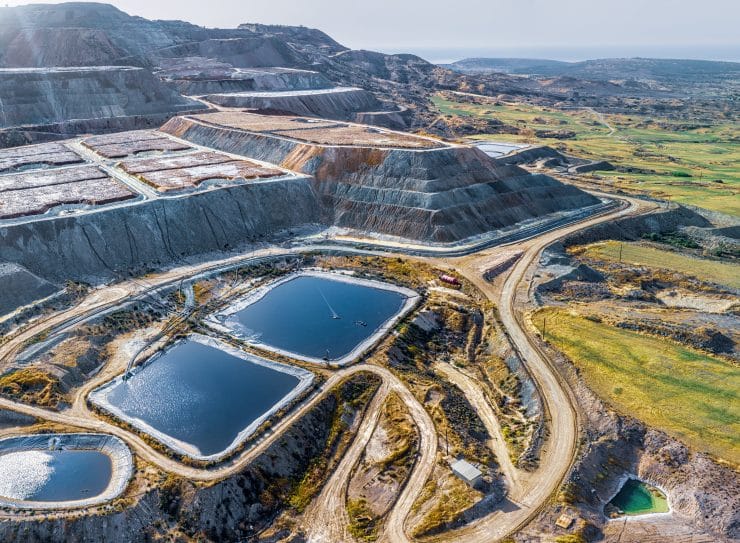4 November 2022
Why Europe needs to open many more mines
The EU’s need for critical raw materials (CRM) has gone from being a slightly hidden issue to topping the agenda.

The EU’s need for critical raw materials (CRM) has gone from being a slightly hidden issue to topping the agenda.

By Elias Rosell, Political Editor for Östersunds-Posten
Ever since the New Stone Age (about 8000–2000 BCE), there has been mining in Europe. It may therefore seem strange to write about mining, minerals and metals in a forward-looking article series called “Science, Not Fiction”. But minerals and metals are the basis for much of the current and future technology.
The EU’s need for critical raw materials (CRM) has gone from being a slightly hidden issue to topping the agenda. In President von der Leyen’s state of the union speech on the 14th of September, she said that the EU would create a European CRM Act. Its purpose is to “identify strategic projects all along the supply chain, from extraction to refining, from processing to recycling”, and “build up strategic reserves where supply is at risk”.
As a justification for why this should be done, von der Leyen stated that “lithium and rare earths are already replacing gas and oil at the heart of our economy”, and “almost 90% of rare earths and 60% of lithium are processed in China”.
The EU must act to become less supply dependent on China. It is a tragic irony that the essential diversification of energy resources coming from Russia following the invasion of Ukraine risks making Europe more reliant on Chinese minerals for solar and wind energy and batteries.
In the same way Russia uses energy as a geopolitical weapon against Europe, China may use CRM against Europe in the future. It is not only a hypothetical risk.
After Japan’s 2010 arrest of a Chinese fishing boat crew off the disputed Senkaku Islands, China stopped exporting rare earths to Japan – leaving the country’s electronics and auto industries without critical raw materials for weeks.
The EU should learn from the past and act strategically. This means avoiding illiberal regimes being handed the power to use their supply chain as a weapon in the future.
Therefore, the European Critical Raw Materials Act should, and probably will, include measures to increase recycling, develop new technologies that reduce the demand for critical minerals, rethink relations with strategic rivals and encourage more mines and refineries.
The most difficult and important measure will be enabling the establishment of more mines. This implies that the EU should start a campaign to foster their acceptance as soon as possible. From Serbia to Greenland and from Portugal to Sweden, there is strong opposition to opening mines for the extraction of strategic minerals and metals.
The Anglo-Australian mining group Rio Tinto’s plans to open Europe’s biggest lithium mine in Serbia were cancelled after tens of thousands protested in over 50 Serbian cities. Even in Portugal, Europe’s largest lithium producer with about one percent of global production, plans for new mines have sparked protests – although they do not appear to be as large as in Serbia.
In Greenland, according to the company behind the plans, one new mine had the “potential to become the most significant Western world producer of rare earths”. Opposing it was one of the main reasons why the left-wing environmentalist party won the election in 2021. Norra Kärr in Sweden is where Europe’s largest defined heavy rare earth mineral deposit can be found. The process of deciding whether or not to establish a mine there has been going on for over a decade without any decision – all the while drawing protests led by Swedish environmentalists.
Admittedly, not every potential mine in Europe should become a reality – high safety requirements must be in place. But more mines than what have been approved as of today do need to be realized. This would represent a goal in terms of strategic autonomy for member states to be able to start mining according to EU safety and emissions standards.
That the environmental movement seems to be against new mines in general is a sizeable problem. The green NGOs European Environmental Bureau and Friends of the Earth Europe write in their report “‘Green mining’ is a myth: The case for cutting EU resource consumption” that resources are “best left in the ground” in the long-term, and their management should be decided “within a truly democratic structure”.
At the same time, the above-mentioned environmental organisations and the environmental movement favour a transition to 100 percent renewable energy. A single wind turbine may need 400 kilograms of rare earth magnets. An onshore wind plant “requires nine times more mineral resources than a gas-fired plant”, according to the International Energy Agency’s (IEA) report “The Role of Critical Minerals in Clean Energy Transitions”. Moreover, 100% renewables might only work with high energy-storing capacity which, of course, would come with the same problems in terms of CRM supply. In its report, the IEA further asserts that if the world is to reach net-zero emissions by 2050, a sixfold increase in mineral requirements for clean energy technologies would be needed.
The environmental movement’s policy is completely incoherent. The green ‘100% renewable’ policy means a sharp increase in the mining that they themselves oppose.
Where should all the minerals and metals come from? The environmental movement’s favourite answer to this is recycling.
We must, of course, recycle resources whenever possible. But meeting a significantly increased demand with recycling is a contradiction. Recycling requires an industry per se. The IEA estimates that recycled quantities of lithium and cobalt, among other things, “could reduce combined primary supply requirements for these minerals by around 10%” by 2040. In other words, we are very far from solving this by recycling alone. The only one who wins if we overestimate the possibility of recycling and underestimate the need for new mines will be China.
As recycling is insufficient, measures are required to increase the amount of mining in Europe. Such measures should weigh the need for more minerals and metals against other environmental factors in the legislation. Let’s be clear about the fact that mines do have an impact on the local environment. In more cases than today, we should accept some deterioration of the local environment to reach our climate goals and thereby improve the global environment. But such a trade-off between different environmental interests is very difficult for the Greens. It is therefore up to liberals, among others, to work for legislation wherein climate change is given greater weight regarding decisions about new mines.
However, improved legislation will have limited benefits if it continues to take an average of 16.5 years from discovery to mining. We do not have time to wait until 2039 for a new supply of clean-energy minerals. A fast track for permit processes around mining is needed.
In addition, tax policy may change to make mining in Europe more attractive. Lower taxes for new mines and refineries along with other incentives that increase the supply of critical raw materials in Europe are a better way forward than subsidies. The taxes that the mining industry would still generate after such reductions should, to a greater extent, go to the regions and municipalities where mining occurs. It is fair that those whose local environment is affected by mining receive a larger share of its revenue. Such a measure is also necessary to increase local acceptance of mining and thus ensure more mines and faster processes.
But this blog series would not be called “Science, Not Fiction” if this article were only about existing technology. After mining minerals and metals in Europe for thousands of years, it may be time for the next step: mining in space. The moon, other planets and asteroids contain a variety of different minerals. In theory, everything from aluminium and cobalt to rare earths could be mined from space.
There are reasons for the EU as a whole as well as other member states to be inspired by Luxembourg, which has developed a “legal framework for space mining”. At the same time, the EU should work towards an international agreement on the peaceful utilisation of space resources.
It is high time for Europe to intensify its search for the minerals and metals of the future.
Author bio

Elias Rosell is an Earth Scientist who is working as a journalist, he often writes about environmental and energy issues. He now works as a political editor at Östersunds-Posten and has previously worked as a research coordinator at the European Liberal Forum.
DISCLAIMER: Published by the European Liberal Forum. The opinions expressed in this publication are those of the author(s) and do not necessarily represent those of the European Liberal Forum.